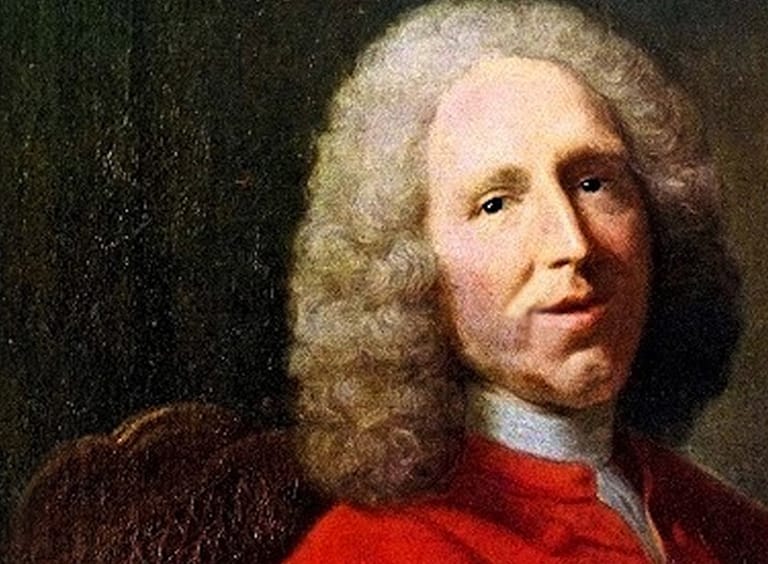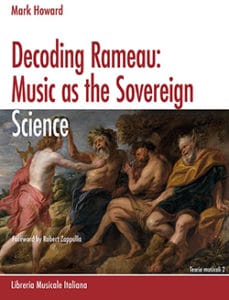Note Worthy

Mark Howard publishes first translation of music thoerist Jean-Philippe Rameau’s masterwork
When Jean-Philippe Rameau published his Code for the practice of music (Code de musique pratique) in 1760, the treatise became the 18th-century composer’s crowning achievement. It was the culmination of Rameau’s vision: a universal theory of music set out as a systematic “book of laws.” The Code came to be considered one of the most authoritative writings on music produced during the 18th century.
But it was never translated. The original—and only—edition in French stood for nearly 250 years.
That is, until Mark Howard made it the focus of his dissertation and subsequent book.
The Claremont Graduate University alumnus (MA, Music, 2007; PhD, Music, 2011) recently published Decoding Rameau:Music as the Sovereign Science (Libreria Musicale Italiana, 2016), a long-overdue English translation and analysis of the Baroque composer’s magnum opus and its accompanying essay, “New Reflections on the Sonorous Principle” (“Nouvelles réflexions sur le principe sonore”). Howard’s book reaffirms the Code’s status as an essential guide to mid-18th-century French musical practice and theory and Rameau’s “crowning achievement.”
“The Code truly reveals how Rameau put his ideas into practice; how he was able to realize his vision across many different areas of music such as keyboard technique, vocal technique, accompaniment, harmony, composition, and even the most basic of musical fundamentals,” said Howard, a musicologist, keyboardist, the reviews editor for peer-reviewed journal Performance Practice Review, and adjunct professor of music at CGU.

Informed by the scientific developments of his time—he was known as the “Isaac Newton of Music”—Rameau early in his career argued that any music theory must be articulated and understood through a mathematical framework, a framework derived from an interconnected set of axioms, definitions, and theorems, for example.
But music reigned supreme in Rameau’s worldview.
“I think the Code’s most game-changing, most revolutionary, and most controversial idea was that music stands on its own as a discipline, as a science, as a form of expression, as a medium of expression,” Howard said.
“Rameau argued that musicians and thinkers should focus on music, not just mathematics. Mathematics is just an abstract tool for representing the properties and relationships of things and actions. Music, on the other hand, reveals its own power through its medium, that is sound.”
Rameau’s reputation was first established with the 1722 publication of his Treatise on Harmony (Traité de l’harmonie). In it, he proposed a number of universal harmonic principles that were so influential they continue to be used in Western music instruction today. Four years before he died, Rameau published the Code as a systematic compilation of rigorous laws that borrow the language and grammar of legal codes.
It wasn’t until 2007 that Howard, as a CGU student, discovered it had never been translated since its 1760 publication. His translation and the accompanying commentary he wrote served as Howard’s 2011 dissertation. He re-translated it into more idiomatic English to make its 2016 book format more accessible.
 “Mark’s book is extremely important because it contains the only English translation of one of the most important theoretical works by one of the most significant and influential French musical figures in music history,” said Robert Zappulla, who wrote the foreword to Decoding Rameau. Zappulla is associate professor in and chair of CGU’s Music Department and the Fred W. Smith and Grace Hobson Smith Chair in Music. “His extensive, somewhat interdisciplinary commentary lends important historical context and is extremely thoughtful and incisive.”
“Mark’s book is extremely important because it contains the only English translation of one of the most important theoretical works by one of the most significant and influential French musical figures in music history,” said Robert Zappulla, who wrote the foreword to Decoding Rameau. Zappulla is associate professor in and chair of CGU’s Music Department and the Fred W. Smith and Grace Hobson Smith Chair in Music. “His extensive, somewhat interdisciplinary commentary lends important historical context and is extremely thoughtful and incisive.”
Howard taught CGU classes on Rameau in 2014 and 2016, respectively, and he traveled with Zappulla to Milan, Italy, in 2015 to present a paper at a conference devoted to the theorist’s influence on 1960s and 1970s musicians.
“My time at CGU was very influential on me,” he said. “Both Professors Zappulla and Nancy van Deusen believed in me and influenced me in countless ways. And that is reflected in the book: attention to detail, writing carefully, thinking creatively, thinking about the background to Rameau’s ideas; I wanted to leave no stone unturned. The Code challenged me in these ways and was therefore the perfect topic for me.”